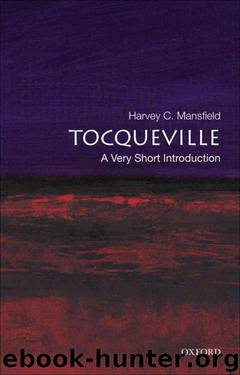Tocqueville: A Very Short Introduction (Very Short Introductions) by Mansfield Harvey C

Author:Mansfield, Harvey C. [Mansfield, Harvey C.]
Language: eng
Format: epub
Publisher: Oxford University Press
Published: 2010-05-30T16:00:00+00:00
Democratic individualism
Moving from ideas to “sentiments,” Tocqueville examines the feelings that characterize the democratic heart. The main one is a sense of weakness that he describes as “individualism.” This is a word we now hear every day and in several senses, usually in a good sense, as in “rugged individualism.” Tocqueville was not the first to use the word, but he was the first to make a point of it. He defines it in contrast to egoism or selfishness, a passionate self-love that is universally a moral vice. Individualism is democratic sentiment, reflective and peaceable, that disposes each citizen to isolate himself from the mass of his fellow citizens and to withdraw into his family, his friends, and himself. It is accompanied by the passion for equality, always stronger in a democracy than the taste for liberty, but it is itself more an erroneous judgment than a passion or a vice. That judgment, proceeding from the democratic social state, is the same one taught by the pantheists and the democratic historians: that the individual is impotent, that he is subject to vast, impersonal forces, and that public virtues are futile. Unlike aristocracy, where hierarchy binds men to one another and to the past, democracy puts them on a level so that, although they extend their good will abstractly and weakly to all humanity, they in fact take interest only in those nearest to them.
Not having endured a democratic revolution, Americans have less individualism than democratic peoples in Europe; in Tocqueville’s phrase, they had the great advantage “to be born equal instead of becoming so.” Since they are aware of their individualism, they “combat” it with free associations and with the strange moral doctrine of self-interest well understood, both of which he discussed in volume 1. Associations draw men from the private ease of individualism into public activity, engaging their self-interest and their ambition while promoting the common good.
The doctrine Tocqueville describes is again “self-interest well understood.” It comes from American moralists prescribing for Americans, he says, and it is “of all philosophic theories the most appropriate to the needs of men in our time.” It accommodates human weaknesses by turning personal interest against itself: “to direct the passions, it makes use of the spur that excites them.” Yet despite the doctrine’s ingenuity, he lets his doubts be seen in the contrast of democracy to aristocracy. Under aristocracy, men spoke of the beauties of virtue and secretly studied its usefulness, but now under democracy, the relation is reversed, and American moralists fear speaking of the beauties of virtue. Virtue that is beautiful might call for sacrifice, and democratic moralists, not daring to recommend that, search for an instance in which virtue is in one’s self-interest and expand it into a general doctrine. Tocqueville names no American moralist, citing only Montaigne, but the most obvious American teacher of self-interest well understood would be Benjamin Franklin. Franklin’s Autobiography shows how to make one’s way up in the world while seeking only to help others and concealing all ambition.
Download
This site does not store any files on its server. We only index and link to content provided by other sites. Please contact the content providers to delete copyright contents if any and email us, we'll remove relevant links or contents immediately.
| Anarchism | Communism & Socialism |
| Conservatism & Liberalism | Democracy |
| Fascism | Libertarianism |
| Nationalism | Radicalism |
| Utopian |
The Secret History by Donna Tartt(19025)
The Social Justice Warrior Handbook by Lisa De Pasquale(12182)
Thirteen Reasons Why by Jay Asher(8882)
This Is How You Lose Her by Junot Diaz(6869)
Weapons of Math Destruction by Cathy O'Neil(6260)
Zero to One by Peter Thiel(5782)
Beartown by Fredrik Backman(5733)
The Myth of the Strong Leader by Archie Brown(5491)
The Fire Next Time by James Baldwin(5422)
How Democracies Die by Steven Levitsky & Daniel Ziblatt(5209)
Promise Me, Dad by Joe Biden(5139)
Stone's Rules by Roger Stone(5078)
A Higher Loyalty: Truth, Lies, and Leadership by James Comey(4946)
100 Deadly Skills by Clint Emerson(4911)
Rise and Kill First by Ronen Bergman(4772)
Secrecy World by Jake Bernstein(4736)
The David Icke Guide to the Global Conspiracy (and how to end it) by David Icke(4696)
The Farm by Tom Rob Smith(4500)
The Doomsday Machine by Daniel Ellsberg(4480)
